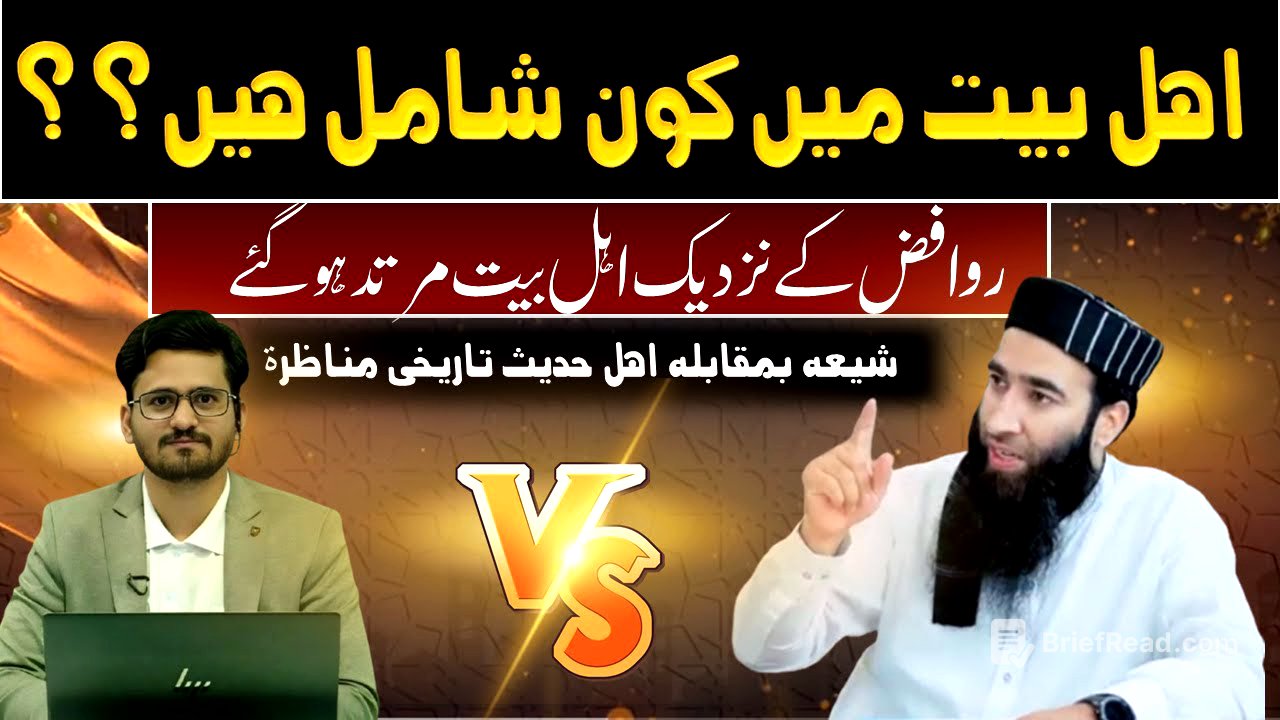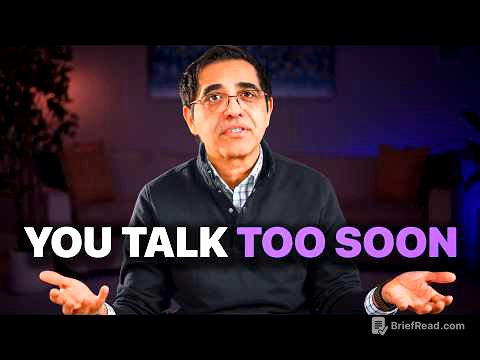TLDR;
This YouTube video features a debate about who constitutes the Ahl al-Bayt (the People of the House) in Islam, focusing on the interpretation of the Verse of Purification (Ayat al-Tathir) in the Quran. The discussion revolves around whether the term is exclusive to the Prophet Muhammad's immediate family (Fatima, Ali, Hasan, and Hussein) or if it includes the Prophet's wives and other relatives. The debaters present arguments based on Quranic verses, Hadith (sayings and actions of the Prophet), and the views of various Islamic scholars.
- The core debate centers on the interpretation of the Verse of Purification (Ayat al-Tathir) and its scope.
- Arguments are presented from both Sunni and Shia perspectives, citing various religious texts and scholars.
- The discussion includes disagreements over the authenticity and interpretation of specific Hadith.
Introduction to the Debate on Ahl al-Bayt [0:00]
The host introduces the topic of the debate: determining who the Ahl al-Bayt are, particularly in relation to the Verse of Purification. He notes the differing views among various schools of thought, some including the Prophet's wives and relatives, while others limit it to Hazrat Fatima, Hazrat Ali, and their descendants. The discussion aims to explore the Quranic perspective and relevant Hadith to clarify the scope of Ahl al-Bayt.
Defining Ahl al-Bayt: Quranic and Traditional Perspectives [3:48]
One participant begins by defining Ahl al-Bayt, referencing the Verse of Purification and its implications. He mentions that different interpretations exist, with some limiting the term to the Prophet, Ameer Momineen, Imam Hasan, Imam Hussain, and Janab Zehra. He emphasizes that the term "Ahl al-Bayt" has various interpretations and that understanding the context is crucial.
The Scope of Ahl al-Bayt: A Point of Contention [7:35]
A participant raises the question of whether the classification of Ahl al-Bayt is close to the Ahle Tashu (Shia) perspective. He seeks clarification on whether the term is limited to specific individuals or if it can include others in a broader sense. The discussion explores the classification of who is considered Ahl al-Bayt and their status.
Authentic Narrations and the Inclusion of Wives [9:26]
A participant challenges the notion that the term "Ahl al-Bayt" can be applied to a cat, requesting authentic references from narrations. He argues that the denial of others being Ahl al-Bayt needs to be proven with Quranic verses. The discussion revolves around authentic narrations and whether the term "Ahl al-Bayt" can be extended to include the Prophet's wives.
Consulting Rasulullah and the Misconceptions of Ahl al-Bayt [13:22]
A participant emphasizes the importance of consulting Rasulullah (the Prophet) to understand the true meaning of Ahl al-Bayt. He criticizes relying on linguistic interpretations and highlights that the Prophet's explanations should be the primary source. The discussion focuses on the misconceptions surrounding Ahl al-Bayt and the need to consult the Prophet's teachings.
The Verse of Purification and the Narrations of Hazrat Ayesha [15:28]
A participant references Hazrat Ayesha's narrations about the Verse of Purification, noting that it was revealed to specific individuals. He challenges the notion that the wives of the Prophet are included in the Misda (reality) of Ahl al-Bayt. The discussion centers on the Verse of Purification and whether it includes the Prophet's wives based on Hazrat Ayesha's narrations.
Arguments for Hasar and the Status of Wives [17:17]
A participant argues that there should be a denunciation of the rest if only five individuals are considered Ahl al-Bayt. He questions the classification of the Prophet's wives if they are not considered Ahl al-Bayt. The discussion revolves around the concept of Hasar (exclusivity) and the status of the Prophet's wives in relation to Ahl al-Bayt.
The Meaning of Hasar and the Narrations of Umm Salma [19:14]
A participant narrates a hadith from Hazrat Umm Salma, stating that the verse was revealed in her house. He questions why she made the statement if the rest of the people were not present. The discussion focuses on the meaning of Hasar and the narrations of Umm Salma regarding the Verse of Purification.
The Debate on Wives and the Rejection of Verses [21:12]
A participant argues that including wives in Ahl al-Bayt is a reality and not inadvertent. He questions whether the wives are being rejected from the verse. The discussion revolves around the inclusion of wives in Ahl al-Bayt and whether rejecting them contradicts the verses.
The Importance of Referring to the Next Statement [21:56]
A participant emphasizes the importance of referring to the next statement instead of just telling one's own story. He argues that debate involves negating the other person's points and not just presenting one's own perspective. The discussion focuses on the importance of engaging with the other person's arguments and not just presenting one's own narrative.
The Argument of Hasar and the Acceptance of Ahl al-Bayt [23:04]
A participant states that they accept Ahl al-Bayt, including Syedna Ali, Syedna Fatima Zehra, Syedna Hasan, and Syedna Hussain. He argues that the argument is only needed on Hasar and whether the verse was revealed specifically about them. The discussion revolves around the acceptance of Ahl al-Bayt and the specific argument needed on Hasar.
The Classification of Wives and the Prophet's Cell [25:08]
A participant questions the classification of the Prophet's wives if they are not considered Ahl al-Bayt. He asks what their status is and why they stayed in the Prophet's cell if they are not part of Ahl al-Bayt. The discussion focuses on the classification of the Prophet's wives and their relationship to Ahl al-Bayt.
The Example of a Saint and the Hadith of Rasulallah [27:41]
A participant gives the example of a saint and emphasizes the importance of following the Hadith of Rasulallah. He argues that the privacy is decided in the palace and that the verse is about their own palace. The discussion revolves around the importance of following the Hadith and the concept of privacy in relation to Ahl al-Bayt.
The Hadith of Umm Salma and the Separation from Voices [29:05]
A participant references the Hadith of Umm Salma and questions whether she ever said she was among the Ahl al-Bayt in the verse. He asks for a Hadith where Rasool said that she is not from Ahl al-Bayt. The discussion focuses on the Hadith of Umm Salma and whether she was separated from the voices of Ahl al-Bayt.
The View of Ahle Tashu and the Classification of Ahl al-Bayt [30:34]
A participant asks about the view of Ahle Tashu (Shia) regarding the classification of Ahl al-Bayt. He seeks clarification on whether they favor classification in Ahl al-Bayt and what the status of wives is in their perspective. The discussion revolves around the view of Ahle Tashu and the classification of Ahl al-Bayt.
The Masaad of Ahl Bayt and the Meaning of Hadith [31:57]
A participant speaks about the Masaad (sources) of Ahl Bayt and asks for the meaning of a Hadith. He requests an explanation of the Hadith where Hazrat Umm Salma said she is from the Ahl-e-Bait and the Prophet responded. The discussion focuses on the Masaad of Ahl Bayt and the meaning of specific Hadith.
The Shan-e-Nuzul and the Hadith of Rasool [33:20]
A participant asks for a Hadith that presents the Shan-e-Nuzul (circumstances of revelation) of the verse. He emphasizes the importance of presenting a Hadith and correcting the meaning of the verse. The discussion revolves around the Shan-e-Nuzul and the need for a Hadith to support it.
The Questions for Maulana Saheb and the Hadith of Rasool [34:32]
A participant notes down questions for Maulana Saheb, including proving the Hadith from the Sahaba Ahle Bayt and presenting a Hadith from one of the Prophet's wives. He emphasizes the need for an authentic Hadith and the denial of al-Hadith. The discussion focuses on the questions for Maulana Saheb and the need for a Hadith from the Prophet's wives.
The Definition of Shan-e-Nazul and the Questions for Shivas [40:07]
A participant explains the definition of Shan-e-Nazul and asks Shivas to answer the questions. He emphasizes the need to prove that any one of the four (Syedna Ali, Syedna Hasan, Syedna Hussain, and Syeda Fatima Zehra) said that the verse was revealed regarding them. The discussion revolves around the definition of Shan-e-Nazul and the questions for Shivas.
The Challenge and the Answer from the Hadith [43:01]
A participant states that they have given a challenge and an answer from the Hadith. He emphasizes that the question is wrong and that they are going to answer it. The discussion revolves around the challenge and the answer from the Hadith.
The Nomination of Awaz Mutara and the Hadith of Rasool [44:14]
A participant states that they have nominated Awaz Mutara and asks if Rasulallah is from the Ahl-e-Bait. He emphasizes that all the Ahl-e-Bait are near them and that the love is near them. The discussion revolves around the nomination of Awaz Mutara and the Hadith of Rasool.
The Ijma of Ahle Bait and the Hadith of Umm Salma [46:17]
A participant questions why they are showing Shia books and emphasizes the importance of mentioning the downfall in their books. He argues that the Ijma (consensus) of Ahle Bait is not just an argument and that they don't believe them. The discussion revolves around the Ijma of Ahle Bait and the Hadith of Umm Salma.
The Hadith of Fate and the Mudas of Bukhari [47:37]
A participant reads the Hadith on fate and emphasizes that it was announced by the voice of one of the Ahle Bayt. He questions the Mudas (criticized narrators) of Bukhari and asks how many sections there are and what belongs to whom. The discussion revolves around the Hadith of fate and the Mudas of Bukhari.
The Hadith of Rasool and the Followers of Ibn Taymiyyah [49:11]
A participant emphasizes that Ibn Taymiyyah is saying that when the Hadith of the Rasool comes regarding something, they will take it. He asks why they don't take it and states that they have left the field open. The discussion revolves around the Hadith of Rasool and the followers of Ibn Taymiyyah.
The Books of Ahle Sunnat and the Claim of Ahle Bayt [49:39]
A participant states that they are narrating from the Sunnah and asks for an argument to that brother. He emphasizes that the claim is that they don't take anything from the bus. The discussion revolves around the books of Ahle Sunnat and the claim of Ahle Bayt.
The Deviating from the Topic and the Ijma of Ahl Bayt [51:11]
A participant argues that they are deviating from the topic and emphasizes that they will not deviate. He states that Badruddin Zarakh has written Ijma Ahl Bayt and that it is a close argument between the Sunnis and their people. The discussion revolves around deviating from the topic and the Ijma of Ahl Bayt.
The Muslims and the Murtad and the Tafseer Burhan [52:43]
A participant states that only four people after Rasulallah S remained Muslims and that all the others became dead. He references Tafseer Burhan and Tafseer Ayashi, stating that there are only four Muslims. The discussion revolves around the Muslims and the Murtad and the Tafseer Burhan.
The Hadith of Syeda Umm Salma and the Difference of Opinion [54:44]
A participant states that they have presented the Hadith from Syeda Umm Salma and that the same issue with Rajla came up again. He emphasizes that their difference of opinion is that this is one thing and that there is one word Hasar. The discussion revolves around the Hadith of Syeda Umm Salma and the difference of opinion.
The Books of Ahle Sunnat and the Question of Syedna Ali [55:36]
A participant states that they have proved it from Ahl al-Bait and asks from whose book they should prove that they are a Sunni. He emphasizes that they have told them from the books of Ahle Sunnat. The discussion revolves around the books of Ahle Sunnat and the question of Syedna Ali.
The Hadith from Rasool and the Viewers [56:54]
A participant states that there is no Hadith from Rasool and that they did not present even one Hadith. He emphasizes that the viewers are not narrating even a single Hadith today. The discussion revolves around the Hadith from Rasool and the viewers.
The Hadith of Hazrat Ayesha and the Questions for Hazrat Umme [58:16]
A participant states that they presented a Hadith from Hazrat Ayesha and that Muslim has no answer. He emphasizes that they gave a Hadith from Hazrat Umm Salma and asks what question they are asking Hazrat Umme. The discussion revolves around the Hadith of Hazrat Ayesha and the questions for Hazrat Umme.
The Hadith of Rasool and the Meaning of Murat [1:00:44]
A participant states that they have not seen any Hadith without Taqi yet and that they have made a statement without any evidence. He emphasizes that Hazrat Ayesha asked them in Adaya Nihaya what they say. The discussion revolves around the Hadith of Rasool and the meaning of Murat.
The Hadith of Salaam and the Question of Hasar [1:02:13]
A participant asks for a Hadith of Salaam from any Jauja and emphasizes that they are presenting the Hadith. He states that they are having a great time and that the prophet is having a great time with them. The discussion revolves around the Hadith of Salaam and the question of Hasar.
The Questions for the Sahaba and the Hadith of Rasool [1:03:09]
A participant states that the first thing to do is to tell the Sahaba how to tell the truth and that the second thing is to answer the question later. He emphasizes that they want to have sex with them and that they will keep sending them reply to the mudas. The discussion revolves around the questions for the Sahaba and the Hadith of Rasool.
The Translation of Fee Baiti and the Question of Hasan [1:05:13]
A participant states that they have accepted the translation of Fee Baiti and asks with which word they will bring out Hasan from the saree. He emphasizes that their question is not mine and that they are saying Asif bhai. The discussion revolves around the translation of Fee Baiti and the question of Hasan.
The Verse of the Quran and the Questions for Maulavi Saheb [1:06:40]
A participant states that they did not even answer the question in the beginning and that they gave the whole 3 aspects of Nazool. He emphasizes that they will tell them all the rest of the questions later. The discussion revolves around the verse of the Quran and the questions for Maulavi Saheb.
The Speech and the Lies and the Questions for the Hadith [1:07:41]
A participant states that they are starting their speech and talking about random things in their speech. He emphasizes that they will answer their nonsense and that they have collected so many lies of theirs. The discussion revolves around the speech and the lies and the questions for the Hadith.
The Hadith of Fee Baiti and the Questions for the Wives [1:08:31]
A participant states that they proved Hasar with the Hadith and asks where they got it from. He emphasizes that they have spoken the words and that it is not proved right. The discussion revolves around the Hadith of Fee Baiti and the questions for the wives.
The Questions for the Ahle Bayt and the Wives [1:09:13]
A participant states that they are asking for help and asks them to recite Bismillah for them. He emphasizes that they just have to show their gratitude and nothing else. The discussion revolves around the questions for the Ahle Bayt and the wives.
The Questions for the Debate and the Answers for the People [1:10:13]
A participant requests to be listened to and emphasizes that they will answer then. He states that many of their things are digested and that they caught them at one place. The discussion revolves around the questions for the debate and the answers for the people.
The Hadith of Imam Hasan and the Questions for Maulvi Saheb [1:11:39]
A participant states that the verse was sung and asks who is doing it Hazrat. He emphasizes that Maulvi Saheb is with them step by step and that they have to walk the steps. The discussion revolves around the Hadith of Imam Hasan and the questions for Maulvi Saheb.
The Questions for the Al Bait and the Answers for the Hadith [1:13:13]
A participant states that they said wait and then they will take the answer. He emphasizes that they are not debating and that they are small. The discussion revolves around the questions for the Al Bait and the answers for the Hadith.
The Questions for the Rasool and the Answers for the Forgiveness [1:14:43]
A participant states that they asked them to write to them at the beginning and that they will answer this later. He emphasizes that they will not take part in the battle and that they will say that everyone in Ahle Bayt is included. The discussion revolves around the questions for the Rasool and the answers for the forgiveness.
The Hadith of Umm Salma and the Questions for the Gathering [1:16:10]
A participant states that they challenged them from Ahle Bait Ahle Bait and that they told them that they are giving them open time. He emphasizes that they are finally giving them some time and that they will tell them right now. The discussion revolves around the Hadith of Umm Salma and the questions for the gathering.
The Hadith of Imam Ali and the Questions for the Rani [1:17:45]
A participant states that they are presenting the Hadith that said Imam Hasan from Imam Hussain. He emphasizes that they should show them from the corner of their eye and that they are telling them this number and its. The discussion revolves around the Hadith of Imam Ali and the questions for the Rani.
The Questions for the Ahle Bayt and the Answers for the Wives [1:18:25]
A participant states that Rasulallah sallalla wasallam said or Ahl-e-Bait whom they believe in have what they have talked about. He emphasizes that their question is again the same and that all intelligent people, whether they are from Fika Jafiya or not, are in deep trouble. The discussion revolves around the questions for the Ahle Bayt and the answers for the wives.
The Hadith of Rasul and the Questions for the Elders [1:19:46]
A participant states that they are no longer one of the Ahle Bayt and that they are not from Ahle Bayt. He emphasizes that they need the argument of Hasar in this and that they don't need a broker about this thing. The discussion revolves around the Hadith of Rasul and the questions for the elders.
The Hadith of Umm Salma and the Questions for the Wives [1:21:06]
A participant states that Umm Salma Rla say that this verse was revealed to them and that the drain in their house is fine in their house. He emphasizes that it was revealed to him and that Allah is the lock. The discussion revolves around the Hadith of Umm Salma and the questions for the wives.
The Questions for the Rectangle and the Answers for the Family [1:23:11]
A participant states that they should take out the rectangle muba hala and that it is also said that and in that too wives were not included. He emphasizes that they should bring their family members and that they will bring their own. The discussion revolves around the questions for the rectangle and the answers for the family.
The Questions for the Ahle Bayt and the Answers for the Wives [1:24:30]
A participant states that they are trying to shorten their time and that people's time is very precious and they should be wasted. He emphasizes that they have brought the real point and that the matter won't end until they come. The discussion revolves around the questions for the Ahle Bayt and the answers for the wives.
The Hadith of Salaam and the Questions for the Wives [1:25:10]
A participant states that they asked the Prophet (peace be upon him) if they can be a part of their Ahl-e-Bait and that they are not from here. He emphasizes that they told them why they didn't and that if it is good then this is the meaning of good. The discussion revolves around the Hadith of Salaam and the questions for the wives.
The Questions for the Bait and the Answers for the House [1:26:17]
A participant states that their question is that Mujakkam has come a little Bhaijaan and that they think it is wise but intentionally trying to deceive. He emphasizes that there are both types of furrows inside him and that if he joins, then the custom of the Arabs is that their teachings of Mujrak are used inside. The discussion revolves around the questions for the Bait and the answers for the house.
The Questions for the Woman and the Answers for the Salaam [1:27:56]
A participant states that they have only one demand and that this is till the end. He emphasizes that there is a demand and that Insha Allah today the world will see that they will not answer this and go away. The discussion revolves around the questions for the woman and the answers for the Salaam.
The Questions for the Hadith and the Answers for the Tale [1:29:23]
A participant states that they have presented them with a tale and that they want to tell them that Musan Ahmed has 26 inside him. He emphasizes that they did not accept that quote and that they accepted the tradition of that Mudas. The discussion revolves around the questions for the Hadith and the answers for the tale.
The Hadith of Ume Salma and the Questions for the Ahl Araq [1:29:47]
A participant states that they have always saluted them Salma Raj Allah Taala Aha and that they hear from the story of Nabi Salam who was the son of Nabi Salam. He emphasizes that when was their wife and that they should tell them when did Husain become Ali. The discussion revolves around the Hadith of Ume Salma and the questions for the Ahl Araq.
The Hadith of Rasool and the Questions for the Prayer [1:32:33]
A participant states that they are praying this prayer and that Allah Allah please remove this question. He emphasizes that if it is, then this will prove that the verse is. The discussion revolves around the Hadith of Rasool and the questions for the prayer.
The Questions for the Group and the Answers for the Sheet [1:33:31]
A participant states that they asked Allah Rasool Salam Al Ma Am I in their group and that they said no. He emphasizes that the question is, am I in their league and that they said no why. The discussion revolves around the questions for the group and the answers for the sheet.
The Questions for the Murtad and the Answers for the Wilayat [1:34:31]
A participant states that they are asking about the Murtad and that his reply did not come. He emphasizes that they say Murtad means that he had described Vilayat Ali and that they denied it. The discussion revolves around the questions for the Murtad and the answers for the Wilayat.
The Questions for the Ahl-e-Bait and the Answers for the Arabs [1:36:02]
A participant states that they are not talking about Harat Ali and that they wonder why Hazrat Ali is included in this. He emphasizes that when there are they included Hazrat Ali among the four. The discussion revolves around the questions for the Ahl-e-Bait and the answers for the Arabs.
The Questions for the Hasar and the Answers for the Nafi [1:37:09]
A participant states that they will tell them how the pain of the inma happens and that Kalma comes, Hasar happens, after Nafi comes Illa. He emphasizes that there is a hasar or the time comes, there is a hasar when if they say four then it is not five. The discussion revolves around the questions for the Hasar and the answers for the Nafi.
The Questions for the Ulama and the Answers for the Sunnah [1:38:36]
A participant states that they need Hasar's argument and that it won't come till doomsday. He emphasizes that Sunny bhai, they think about all their points and that the one who has the answer to every question is Atiq Rehman Alvi. The discussion revolves around the questions for the Ulama and the answers for the Sunnah.
The Questions for the Umm Salma and the Answers for the Zaid bin [1:40:16]
A participant states that they are going to debate this and that they have guests coming to both of their homes. He emphasizes that the basic thing is that see, if both of them have if the statements of both are not an argument then what will end. The discussion revolves around the questions for the Umm Salma and the answers for the Zaid bin.
The Questions for the Jad Bin Aram and the Answers for the Quran [1:41:13]
A participant states that they are going to talk about it and make the topic a little broader. He emphasizes that they kept the topic in the beginning hey Ahle Bayt, they are in Tahir, it is complete. The discussion revolves around the questions for the Jad Bin Aram and the answers for the Quran.
The Questions for the Fun Friend and the Answers for the Habal [1:41:26]
A participant states that they would like to thank them for their and that they are extremely thankful to them. He emphasizes that Fun friend Janab Ateeq Rehman Alvi sahab accepted their wish when they said. The discussion revolves around the questions for the fun friend and the answers for the Habal.
The Questions for the Hadith and the Answers for the Mudle [1:43:47]
A participant states that they asked him a question first and that they didn't even answer those two. He emphasizes that they said bro verse number 33 of Surah Ahaz, a hadith related to it. The discussion revolves around the questions for the Hadith and the answers for the Mudle.
The Questions for the Wife and the Answers for the Sahaba [1:44:26]
A participant states that they were saying wife is not here brother and that they say the passengers are being loaded. He emphasizes that it is getting too much here Sahaba Karam is also included, there are companions in Ale Bayt as well. The discussion revolves around the questions for the wife and the answers for the Sahaba.
The Questions for the Rectangle and the Answers for the Shame [1:44:53]
A participant states that Janab Imam Hasan al-Salam this is their next question brother and that he told them to bring this rectangle piece of cloth. He emphasizes that he said that this they brought it for them brother, they will get it the same way. The discussion revolves around the questions for the rectangle and the answers for the shame.
The Questions for the Navi Sarfi and the Answers for the Graves [1:45:36]
A participant states that their Hadith says their Hadith is better than them and that they will explain, check the translation brother. He emphasizes that they are an Arab, Navi Sarfi screamed in the graves and that everyone screamed in their graves, translation. The discussion revolves around the questions for the Navi Sarfi and the answers for the graves.
The Questions for the Hadith and the Answers for the Sheet [1:47:10]
A participant states that they are going to listen to this and that please give them a reference to who said this sir. He emphasizes that it is said here, they keep referring to this further. The discussion revolves around the questions for the Hadith and the answers for the sheet.
The Questions for the Hawala and the Answers for the Mouth [1:48:12]
A participant states that they are giving them their full reply and that they did not let it go in the air. He emphasizes that they said na and that they are giving it to them brother, they are giving it to them for reference. The discussion revolves around the questions for the hawala and the answers for the mouth.









![Squidward gets an Anti Piracy Screen gets arrested and gets grounded [don't choose Piracy!]](https://wm-img.halpindev.com/p-briefread_c-10_b-10/urlb/aHR0cDovL2ltZy55b3V0dWJlLmNvbS92aS9ydzFyaXVEY0dpYy9ocWRlZmF1bHQuanBn.jpg)